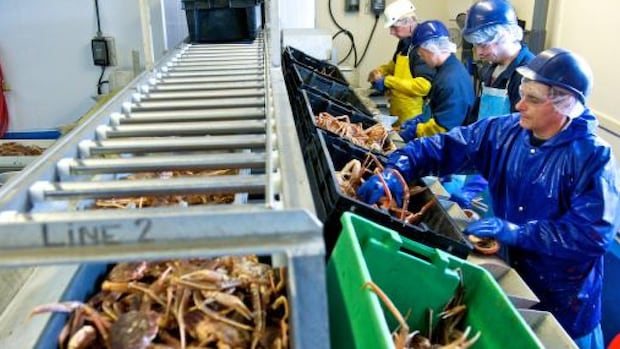Nova Scotia·NewA Glace Bay fish plant worker from the Philippines says the end of the federal Temporary Foreign Worker Program could cut off her family’s financial lifeline.‘I am the breadwinner,’ says 33 year-old fish plant workerCBC News · Posted: Sep 14, 2025 5:00 AM EDT | Last Updated: 2 hours agoWorkers are shown at a fish plant in Cape Breton. (Vibe Creative Group)A Glace Bay fish plant worker from the Philippines says the end of the federal Temporary Foreign Worker Program could cut off her family’s financial lifeline.Thirty-three year-old Charmine Sanchez is her family’s main provider. She sends money home to help her mother’s small business.The role fell to her after her father became ill and could no longer work.”I am the breadwinner,” she said. The program faces opposition in Canada. Pierre Poilievre, the leader of the federal Conservatives, has called for its end.”Under the Liberals, too many corporations are relying on cheap foreign labour while Canadians pay the price,” read a statement by the Conservative Party announcing its opposition to the program. “That’s as Canadians struggle with an unemployment crisis that CIBC says matches ‘levels typically only seen during recessionary periods.'”Sanchez is one of nearly 4,000 migrant workers in Nova Scotia, a group primarily employed in the fisheries and agriculture sectors.Charmine Sanchez says she is the breadwinner for her family in the Philippines. (Zoom)Damien Barry, CAO of Louisbourg Seafoods Group, says this is the story of many of the workers in the plant, who come to Canada from the Philippines and Mexico among other countries to help support their families back home. He says the comments from the federal Conservatives are “dangerous” and show “a fundamental misunderstanding of the business realities” in Atlantic Canada, especially in rural coastal communities. Barry says Louisbourg Sefoods does employ local workers, but it faces an aging workforce. Furthermore, he says there are simply not enough local people to take up all the jobs, which is why they depend on temporary foreign workers to fill the gaps. He says that the relationship between unemployment and temporary foreign workers in the Atlantic fisheries industry is a myth, as companies must first prove through an assessment process that no Canadian is available for a job.”We’re required to advertise positions for four weeks, we’re required to interview people, we’re required to keep a record of these interviews and who’s applied for the job,” he said. Without the program, Barry says, the fish processing sector would not survive, and that would mean the loss of jobs, both for the temporary foreign workers and locals. Damien Barry is the CAO of Louisbourg Seafoods Group. (Zoom)On top of the money, it was a dream for Sanchez to come to Canada when she heard that one of her uncles moved to British Columbia years ago. After working in a factory in Taiwan for eight years, she learned about the temporary foreign worker program and saw her chance to make it a reality. She secured her first Canadian job in 2024 at a fish processing plant on Newfoundland’s Fogo Island. She now works in Cape Breton for Louisbourg Seafoods Group processing and packaging crab and fish.She says she will go back to the Philippines if the program is scrapped and she can’t get a work permit or permanent residency in time.But for now, she says she takes it one day at a time and does her best to provide for her family, especially for her younger sisters, who she says motivate her. “[We’re] very close,” she says. “They call me every night when I go to sleep.”
Temporary foreign worker in Cape Breton concerned about program’s future











